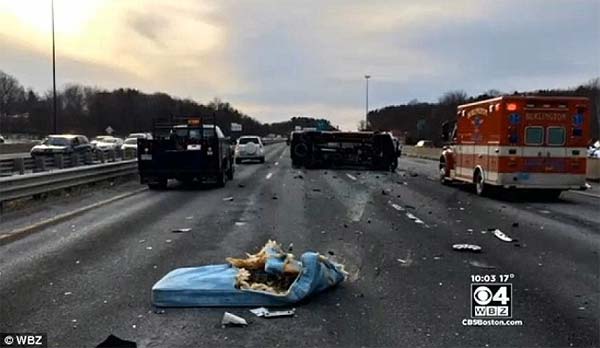 Vehicle operators who secure loads to their vehicle must insure that those loads are safely secured before traveling on our public roadways. If the driver does not secure the load and as a result it injures someone, that driver is responsible for the harm.
Vehicle operators who secure loads to their vehicle must insure that those loads are safely secured before traveling on our public roadways. If the driver does not secure the load and as a result it injures someone, that driver is responsible for the harm.
On January 28, 2014 Frida Litvak, 56, of Framingham, Massachusetts, left work early to take her disabled father to an appointment.* According to the state police, she was driving on Interstate 95 South near Exit 32 in Burlington, Massachusetts, when a mattress fell off a dump truck and blocked the travel lane bringing traffic to a halt. A car traveling behind Litvak did not stop in time and crushed Litvak’s vehicle. As a result, Litvak died.
According to National Highway Traffic Safety Administration (NHTSA) data, in 2010, there were about 51,000 crashes—including almost 10,000 injured persons and 440 known fatalities—involving a vehicle striking an object that came off of another vehicle or a non-fixed object lying in the roadway.**
In 2012 Congress has directed the NHTSA to improve its data on unsecured-load incidents. It also directed the Government Accountability Office (GAO) to report on state laws and related exemptions and punitive measures regarding unsecured loads on non-commercial vehicles, such as cars and light trucks used for non-commercial purposes. .**
The NHSTA collected additional data beginning in 2013. The public will have access to this data sometime this year after the data collection is completed and quality control checks have been done.
All states have some level of fines or penalties for violations of unsecured-load statutes. Most states have specific penalties ranging from as little as $10 to as much as $5,000; fifteen states include possible jail time.**
The GAO report stated that “teaching drivers about the importance of properly securing the load in any vehicle or trailer before driving—is the key component to reducing unsecured-load incidents.” Ten of the 50 states and the District of Columbia reported they have a safety or education program that pertains to unsecured loads on non-commercial vehicles. ** Massachusetts is not one of them.
The dump truck driver who did not secure his load, kept going after the collision. It remains unclear whether he knew the mattress had fallen off the truck causing serious injury. Police continue to investigate the identity of the dump truck driver.
If identified, the Estate of Ms. Litvak has a right to pursue a wrongful death action against the truck driver and/or any person/company responsible for securing the mattress. If, however, Ms. Litvak cannot identify the truck driver and/or offending truck, Ms. Litvak’s Estate has rights to pursue uninsured motorist coverage under her own policy.
In Massachusetts, every person with auto insurance must have uninsured motorist coverage (Part 3, Bodily Injury Caused By An Uninsured Auto) through her own policy or that of blood related household members. Such coverage protects victims who were injured by owners or operators of autos with no insurance. In Massachusetts, unidentified hit and run vehicles (like the one in Ms. Litvak’s case) are considered “uninsured” pursuant to the policy.
Even though the person, who rear-ended Ms. Litvak with his 2014 Tundra truck, was identified and may have responsibility here, the unidentified dump truck owner and operator also has responsibility that is covered under the appropriate uninsured motorist policy.
If you want to learn more about how to navigate the complexities of truck accidents, wrongful death actions and/or uninsured motorist claims, contact our experienced Massachusetts personal injury lawyers.
*Learn more about Frida Latvik’s life and contribution to her community.
**Learn more about federal and state efforts related to accidents that involve non-commercial vehicles carrying unsecured loads.
Learn more about your auto insurance policy in Massachusetts.
Learn more about what happens when an at-fault party leaves the scene or is uninsured?
Learn more about our experienced attorneys.
